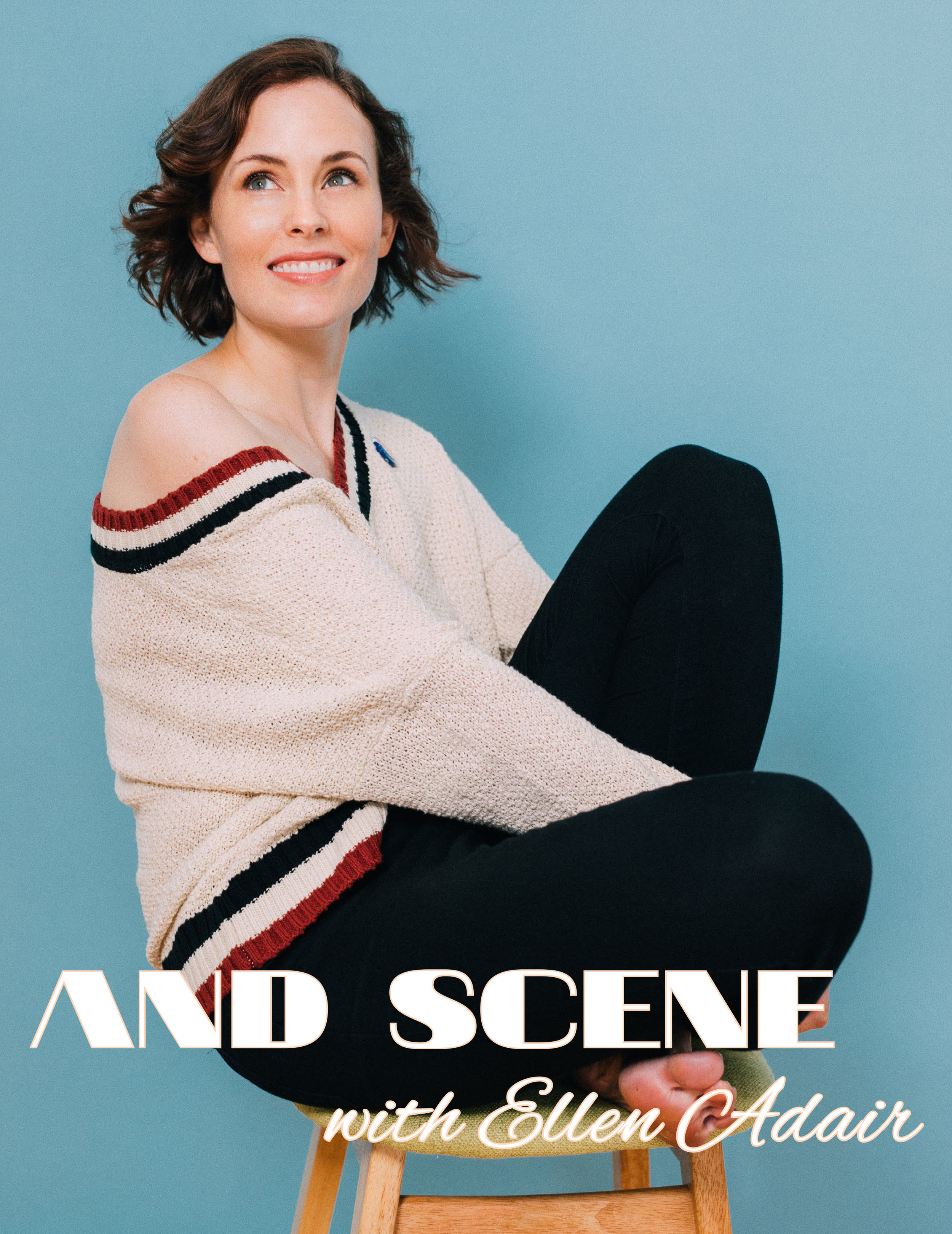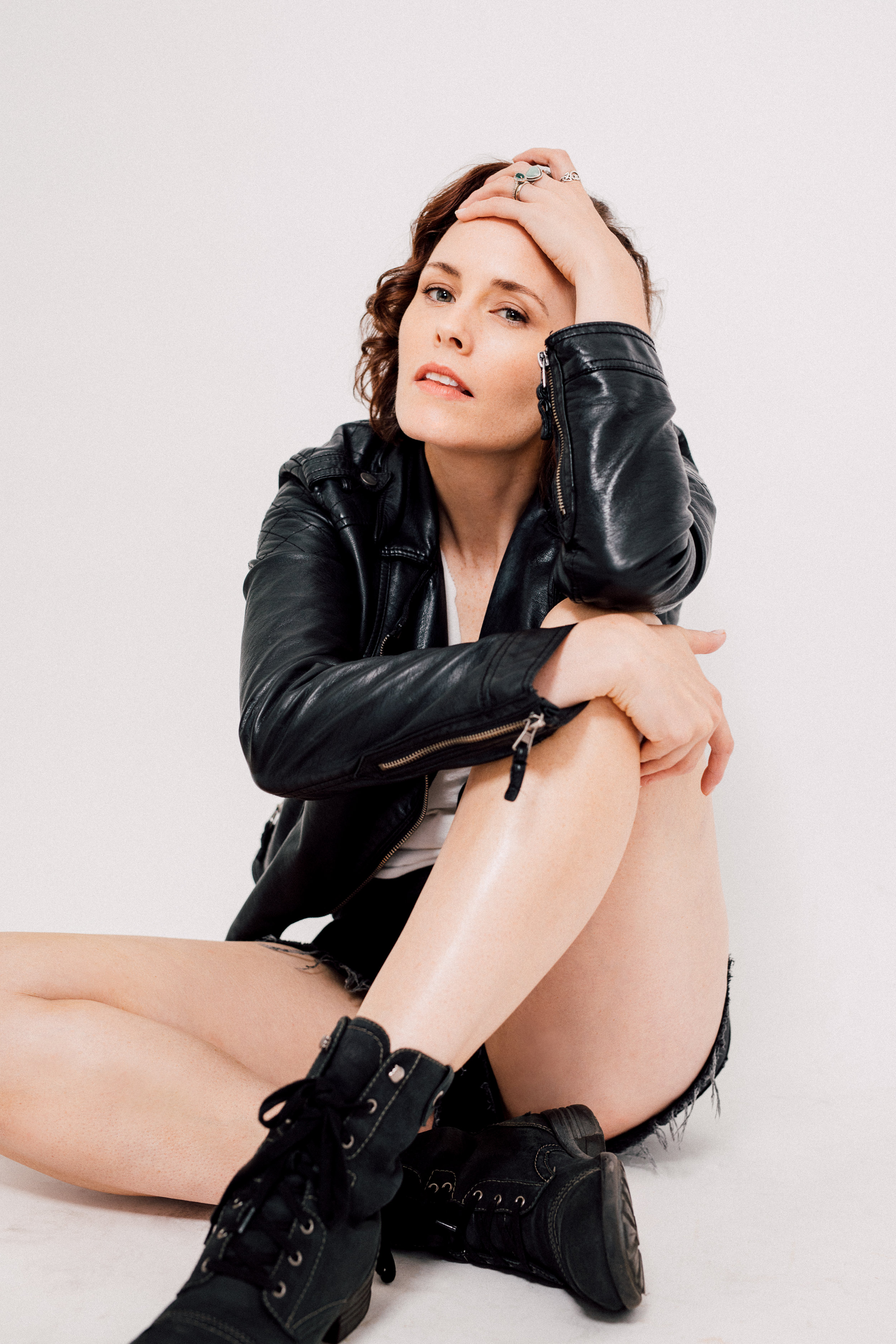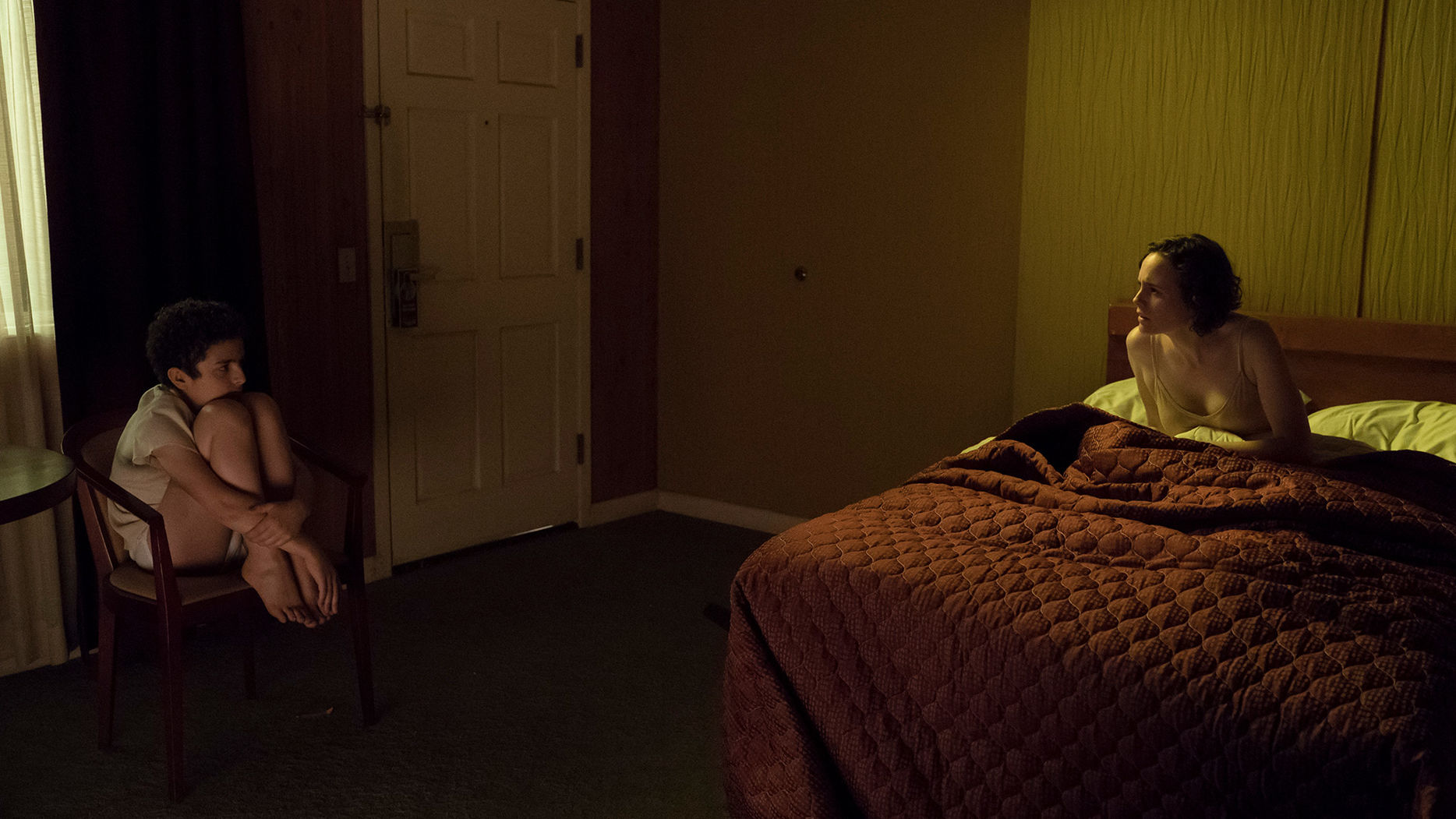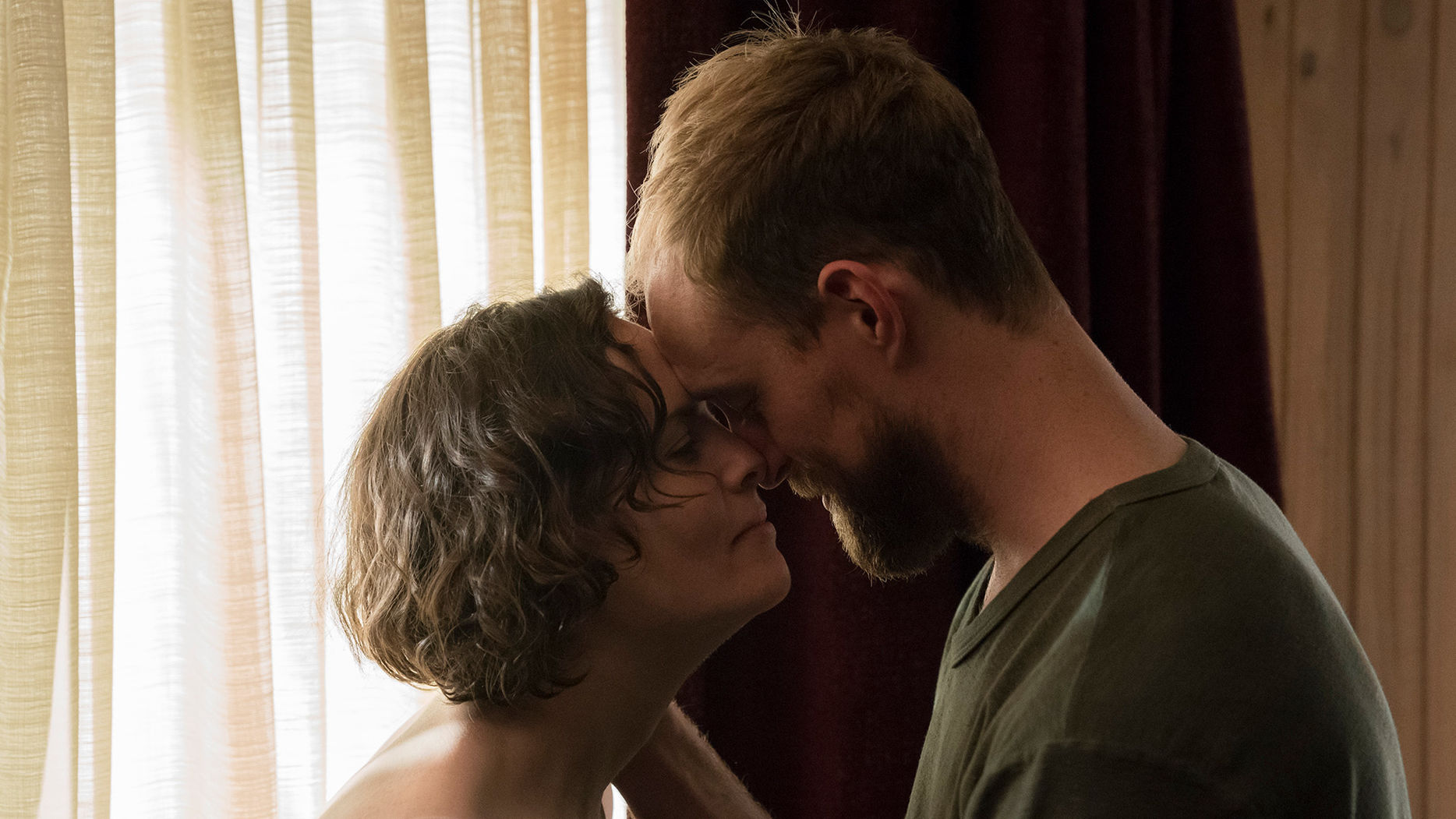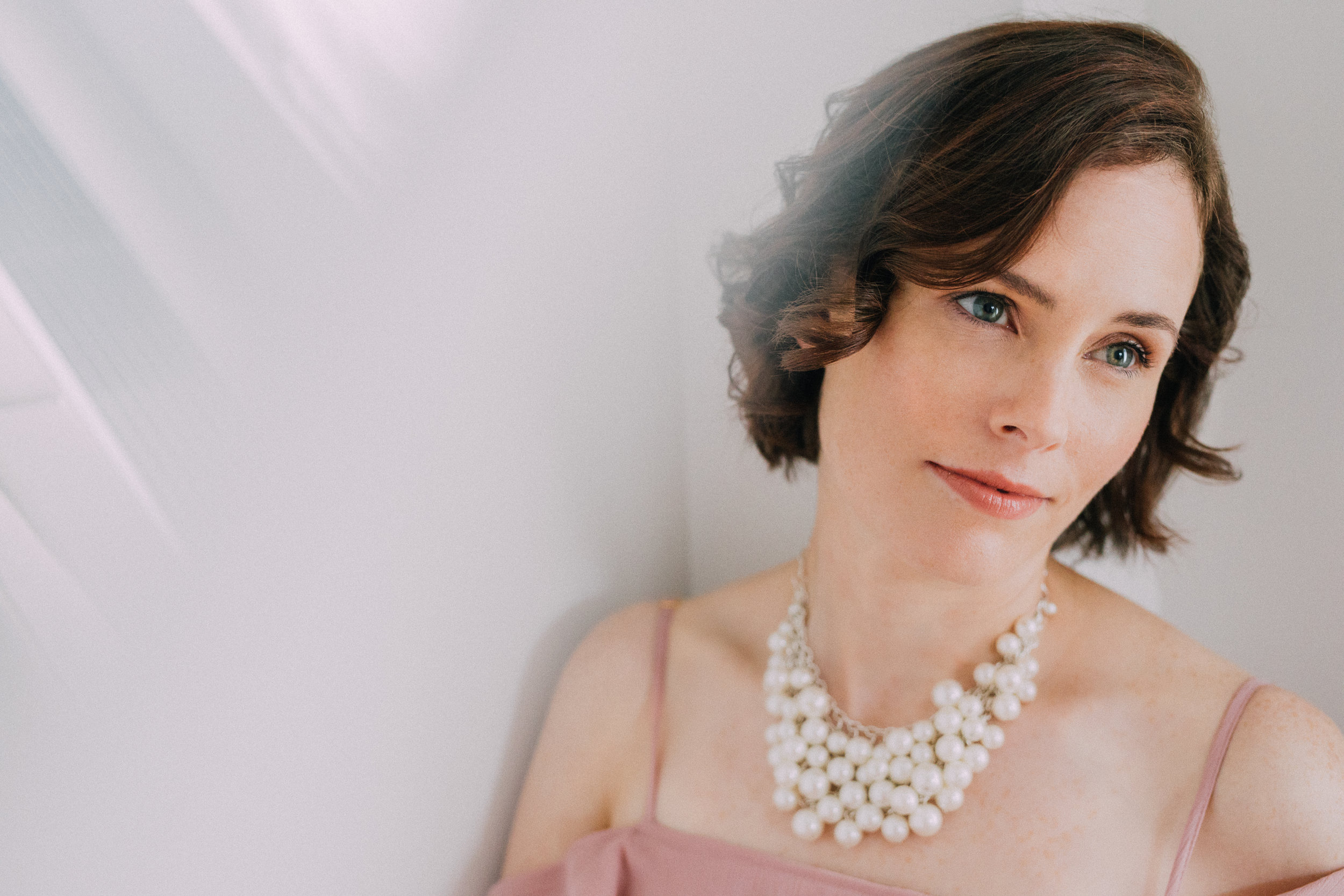There are shows that give us the chills because it draws you in, you're trying to figure out how it all comes together and when they're limited edition series, you hope it comes back again. That's how we feel about USA Network's The Sinner which is back for its second season to show us a crime that you couldn't believe that took place and then retraces its steps to tell you why it went down and how people and experiences are a lot more connected than you can imagine.
The cult following of the show comes through based on actors who play characters that don't have clear lines on being either good or bad. Ellen Adair who you have seen on HBO's Veep, NBC's The Slap, Showtime's Homeland and Billions, and currently plays Bess McTeer in The Sinner. She sat down with us to talk about her process as an actor, the scene that had everyone shocked within the first 10 minutes of the first episode (the second scene if you haven't seen it spoilers - you've been warned), character island and the Phillies!
ATHLEISURE MAG: So excited to talk to you. I was obsessed with The Slap. When that came out -
ELLEN ADAIR: Oh wow! You’re the only person in America!
AM: Truly loved it. That show was just riveting and then, I’m just going to say it, the scene from The Sinner, was beyond!
EA: Oh thanks!
AM: Everyone who has watched that has been left with – what? So we’ll delve into that. There are scenes that are in cinema and TV and you think of the horse’s head in The Godfather, but you’re 10 minute situation was like that kind of scene in my opinion.
EA: Oh my goodness, thanks – I mean like, move over dead horse's head.
AM: I mean, you were still going.
EA: What a great compliment – thanks!
AM: Can you tell us about your background and how you got into acting. You’ve been in a lot of things, like Homeland.
EA: So I wanted to be an actress since I was like a tiny child which belies some type of personal development I guess. But it was just like children’s theater that I did. I wasn’t a professional child actor and I think that really my love was the theater and I think that that was partly because both of my parents were college professors and are staunchly (less so now, particularly my mom) anti-TV. So I didn’t have a TV growing up. So we would go out to see movies, but I think that my parents had this real thought about it being in the house as a source of a constant distraction. I read a lot and we went to theater and I saw TV at friends’ houses. When I was 10 years old, I said I wanted to be a stage actor and it wasn’t until I got into the professional world that I started working on camera a little bit and I was like, “oh I love this, I love this SO much.”
For me, I actually did Shakespeare at an early age. I did my first Shakespeare at the age of 12. My first professional/semi-professional thing when I was 15. That was also Shakespeare. What I love so much about Shakespeare is that there is so much that is technical about it that it allows my artist brain to just free up because there is this great sense of being like on a train, I don’t have to get on a boat, I just get on the train and take it to the end of the play. I just kind of say, ooo what I ride!
I feel kind of similarly about on camera stuff. In that there is so much stuff that is technical about it that part of my brain is able to be free and spontaneous about it. That way, I can be completely real about it.
AM: What is your process when you are looking at a character that you want to play? Once again, I loved you in Billions (Showtime) – especially when these characters are so different. You have played a number of characters across shows and although I know it’s you – you bring such a different approach to each one. Some people when they portray roles, still bring a lot of themselves into each one – do you get what we’re trying to say?
EA: Yes I do know what you are trying to say and I’m really touched that you say that because I think that is – it’s not a part of my mindful process so much as I guess, I don’t know coming from my sort of life reading a lot, and I was an English and Theater major in college and so I really love text. I love textual analysis so for me I guess, it all just comes from me really looking at the script and looking at what the writer is doing and then just imagining if I was that person in that place. So I don’t think about, “oh this is – I don’t judge my character in any sort of way" and I really feel that I am just playing myself, but if it were me and my entire life was different and my development was different and I did this thing and these were the words that I say or at least that is 100% of my process for on camera stuff.
For theater, it’s a little different. Sometimes I will mostly think about how would this character sort of hold themselves physically different or how their voice would be physically different then mine. So it’s also sort of like, technical things that show up. But, then there’s – I don’t know – why I do the thing as there is some kind of magical thing that happens and if I just put myself in the situation then I am just suddenly this totally different person. So on my – I remember on The Slap, one of the producers, because it was like the first big thing that I did for TV. I had done a couple of small reoccurring things before. But a producer came up
to me and we were in the middle of filming and really quickly he said, “I love your performance on this” and I thought, “I have a performance?” I mean I was just so focused on the thought of, what if I was a lawyer, a D.A. and got some wonderful thoughts from Ken Olin (Dir/Exec Producer - This is Us) – one of my favorite directors that I have ever worked with – I adore him. I incorporated those into thinking about what would be my life goals and what I would want to be. But I didn’t think of it as a performance and similarly, when I came in on my first day, I thought that I was just going to say the words and everybody was like, “oh I really love what you’re doing,” and I thought, “I’m doing something? Great, I’ll keep doing it.”
Working on The Sinner was just incredible – it was one of the greatest blessings on my life so far and part of what was so much fun about that was just that – the circumstance that Bess is in – it’s so extreme and different than the circumstance of other people that I have played. It was just that a whole new person just came out.
AM: Tell us about the process of getting on the show, what it was like working with Bill Pullman and the idea that The Sinner tells you what happens, but why did it happen and what are the circumstances around it that made it happen. Which reminds me of elements of The Slap.
EA: There’s so many wonderful things to unpack in what you just said! For me, a real comparison between the works The Sinner and The Slap is that we’re always talking in both cases, that there are sets of characters that have some sense of redeeming qualities and some less attractive qualities to put it politically. That’s my favorite kind of story, favorite kind of TV, favorite kind of movie, book whatever. I think that some people, it’s not their favorite.
They want it to be where this is the good guy and this is the bad guy. But I really enjoy digging into that kind of stuff. In terms of my experience with The Sinner, I had watched it because actually, a lot of the crew is the same from Billions – the genius Director of Photography Radium Cheung – some of the A.D.s that I knew from Billions said they were working on this and I watched it. But then I rewatched it when I was going in to audition for it, and having just done Homeland for 5 months, what I was struck with so much was how much everyone and all the characters take their time. How much space for human life is allowed versus the kind of person that I normally play that is very talky, journalists, lawyers, political animals – just be kind to Janet because she is so wonderful.
That was a conversation that I had with Bill at the very first Table Read. When I just sort of fangirled him and talked to him about how amazing his performance was in the first season.
What I loved about the show was that it is really populated with humans that are always saying something but not speaking. There is so much clearer speech that is not articulated in this show and it’s something a little more like indie film and Antonio Campos (Director + Executive Producer) one of the really big geniuses behind the first and second season has a background in indie film and he just brought that sensibility to the show. I found that also working on it that I am so hard wired to just pick up the pace and even though I knew that from watching the show not to do it - but ke kept reminding me that, no no - you can take it as long as it wants to take - if you want to say something else, just throw it in” and I thought, “oh this is a new fun thing to work on.”
AM: How long did you film this and are there any snippets that you may be able
to share with us for our readers at Athleisure Mag.
EA: We started filming in May.
AM: WOW!
EA: Yeah and we wrapped … my last day on set was a week before production wrapped. So the first 2 episodes were filmed in tandem which is the right phrase. Which sometimes there were tandem crews, 2 things filming at the same time, because the aesthetic of the show is to film a certain amount of coverage, but they also had to do it within a TV schedule. It was cross-boarded which is the phrase I was looking for because there were so many locations that were the same. That motel room was built on the stage so all of those shots were not on location, there were just a few things that we shot as the motel which includes the scene with the motel manager and things like that. So what can I tell you – I mean I can say I guess, that you will see more of Bess and that what’s really fun is that the flashbacks go back pretty far back. That was certainly fun to remember what human being I was in 2004 and what that meant. The mystery is really the whole thing so I can’t really …
AM: I know but we had to try! So the whole death scene with Bess – how many takes did it take. How much of it came from what the script stated and what part was what you added into it. It just seemed so raw and so much – but so good.
EA: There were many takes and we worked on that scene for a whole filming day.
AM: Woah
EA: Yes just the death scene. Not really much in terms of dialogue. Now that includes the stuff that Adam who plays Adam had to do, which includes the stunt stuff that he did which has the incredible shot of him falling out of the shower. That element will add more, but getting the shots from all the different angles and the special effects things – that still to me seemed fairly early in the process was indicative to me of the level of artistry in the production. So normally, an average filming day and you probably know this is 6-8 pages. So as a script page, the death scene is maybe a page or ¾ of a page but we spent a whole day working on it and we also actually had a day of rehearsal before we had even started filming so we could figure out basically what it was going to be and I talked with Antonio and I said, "you know, I have been watching everything that I can find of videos of film scenes where people are poisoned. Is there anything you can think of where this seems more of the thing and not this." I watched some ridiculous thing where a woman was throwing herself around to every piece of furniture in the room and I thought, “that doesn’t seem like something I should do.” He was like, “no, nothing really comes to mind,” but he said, “you might want to look at videos of people having seizures,” and I’m always dutiful about my homework and I went home and looked at a lot of people on YouTube who were having seizures at home – not film of this. It exists and it’s strange what people will put up on YouTube. In my life an as actor, my YouTube searches are so weird that whatever the computer thinks about me … “I don’t know what they should market to her” – I see a lot of weird ads.
I watched a lot of videos and I was interested in what people’s hands did and that violent convulsion thing is where we ultimately decided to take it. Then the rest of it, we sort of in rehearsal just old school rehearsed it to see what if I would fall to the bed and then the door of the bathroom and then try to save Adam – so it was basically being specific to what was happening in my body every single moment. Now I’m trying to save Adam and now I’m going to vomit and turn away and here’s the moment where I realize that Julian must have had something to do with this. It was a tough day of filming because 3 days before, for the first time in my life, I had developed Vertigo. So actually, it’s just Benign Positional Vertigo – it’s still with me when I lay down to go to sleep. Whenever I would change positions or elevations, I’d get really dizzy. So I thought on that day, I was lucky that it wasn’t a fight scene where I have to do this and look like I'm in control - I feel awful and I am dying so I guess I'll #useit which is what we said all day. And even by the end I would just lie down on the floor really quickly and then I would stand up to feel really awful.
AM: That is dedication!
EA: Well you know it’s just like, this is not a great situation and I wish I had felt well so that I could be in control of my body. As long as it was happening, I may as well take the roses along with the thorns or make lemons out of lemonade – whatever cliché term you’d like to use. It was a trying day, but at the end of the day I felt like I had died and come back to life.
AM: Is it easy for you when you’re done filming to come back to you the person? Some people are so into their characters that it takes them 2-3 months to leave that character. How is that for you and how do you keep that separation?
EA: Hmm it’s a really great question. I think it’s been more challenging for me in my life with theater where you're working on something every single day that’s probably also more of a challenge for people who are doing say a film that they are doing every single day. Whereas, I think that the most days in a week that I worked on the show was like 3 days in a week. So it wasn't every single day and then I wouldn't be working at all the following week. That said, I feel like I always miss my characters when they are not around anymore. Like a Quixotic small victimless tragedy for me as there is nothing that I can hug, there is no person that I can embrace. I really feel like there is this other person that I am in communication with when I am acting and it shows up for me the most very organically and this happened – where my characters have different gestures and little things that they do that that is a residue that will stick around. I’ll do that thing that that character did and I’m like, “oh” it feels like finding a loved one who has passed and seeing their shirt. It’s not that sad as I don’t want to compare it like that –
AM: Totally understand, as a fashion stylist, when I am working on clients or moodboards that it’s in your head so much much that when it’s done, I’ll see something and then have to remind myself that I don’t need it because it’s done and the project is done.
EA: I feel that as soon as I get a character, it’s the little piece of sand in like the oyster of my heart that I am always adding layers to that pearl that everything I see in the world is part of that person. When I don’t need it anymore, I still kind of keep adding to that pearl.
To a certain extent, one way in which characters will revisit is I will play a new one and I sort of feel – and this is a metaphor – that the angelic spirit of the other character will say, “let me lend you these things that were helpful for me” so that I can use them again. I am such a nerd. I have a book of poetry which will be published this fall and most of the poems I wrote are from awhile ago, but they’re about being an actor and a life in the theater and it is mostly about characters. Very much so about this thing that we’re talking about. The relationship between the actor and the character that are like this friend and what I have really come to love and have a relationship with them although we are sort of the same. And in one of them, I sort of create this metaphor where I am an island where all of my past characters live and that when a new character comes and sort of materializes, on the island and asks what this place is – all the other characters are like, “here you can use this” and that’s a poetic metaphor, but in a sense that’s all the people still living on that island.
AM: When is this book coming out and what is the name of it?
EA: The name of the book is Curtain Speech. I was trying to come up with a name that is actually sort of private – being backstage and that is where the conversation between the character and the actor takes place. Or it’s in your trailer or the moments before the take. When you step on stage or when filming starts, you’re one person and you can’t have that conversation again. Curtain Speech is actually the thing that someone will come out and say, “please turn off your cellphones, here are the exits and thank you for coming.” It’s the title I came up with and I don’t have an exact date when it will be coming out, but it might be available for pre-order on Amazon now – I can check with my publisher.
AM: What other projects do you have coming out that you can tell us about?
EA: Well, I will be in Season 7 of Chicago Fire! Other than that, I am working on writing a series like many an actor is. In terms of the little people of sand, it’s always around that series and that character and I developed the idea with a friend of mine, Chris Carfizzi from Billions who plays Rudy and so we wanted to work on something together. But he has a small baby and I sort of took the lead on writing it. We also want to – when our lives are sane enough – probably think about filming a scene so we can shop it around.
AM: So you’re based in NY, where do you love to eat, shop here, workout etc?
EA: So I love Vietnamese food and I can eat it everyday! Probably one of my favorite restaurants is probably OBAO in Hell’s Kitchen. Whenever anyone wants to get lunch, I’m like, “Oh do you like Vietnamese food?” I also really Asian food in general – I’m a big lover of sushi and a friend of mine have had a date for 3 months that we have kept moving to go to Nakazawa, but you have to make a reservation way in advance. Everytime we have made one, I always end up working on a show. I mean in this week, this is the one day that I am filming so that hasn't happened yet. I really love Koreatown because it's right in the middle of the city so it’s not like you have to go all the way down to Chinatown. I also live in Queens and I live in Jackson Heights and I love the Indian food there and Tibetan food, so good! There’s this place Faul. It’s impossible to find as there is no storefront and you go up a random staircase, but it is very close to the Jackson Heights stop. Lassa Fast Food is behind a cellphone store - if you didn't know it was there, you’d never see it. I love living so close to Flushing because my husband and I will just hop on a train and feel like we’re going to another country and that’s really how Flushing feels.
I tend to workout at my local gym and I can’t run outside anymore. I can run on a treadmill and that’s about it.
“... my characters have different gestures and little things that they do that is a residue that will stick around. I’ll do that thing that that character did...”
AM: We know that you’re a huge Phillies fan as we have seen your Instagram - so are you from Philadelphia originally?
EA: Yes nobody chooses the Phillies. But I’m from there originally and neither of my parents are from Philadelphia actually, my mom’s from Virginia and my dad’s from Oregon – they were like, we’ll adopt the Phillies. I went to games in utero and then as a babe in arms. Someone asked me if I remembered my first baseball game and I was like, “no, I’ve been going for as long as I can remember.” They’re my life partner as I like to say.
AM: Do you have season tickets or do you go when they’re always here?
EA: I make sure I see them pretty much when I am here. Season tickets are not super practical living in NY, but I do try to see a couple of games in Philly every season. Last season I didn’t because I was doing an Off Broadway show that was basically all of baseball season and that was tough for me emotionally. There are a few Mon games I went to. So in 2016, I saw 16 games and so I knew that that would be my goal. And what I like about this is that I can move the goal post in a good way every year. This year, I have already seen 18 games and there is still a bit of the baseball season left and I am going to a Phillies game next week.
AM: Are you an Eagles fan too?
EA: Um, sure, is the most accurate answer and I was not raised on the religion of football at all. So definitely supported the Eagles this season and not in any sort of a bandwagon way. Did I want them to defeat the Patriots as they are the Yankees of football, absolutely I do. Actually, I watched the Super Bowl with Dylan Baker in Virginia as we were there shooting Homeland and he’s a big football fan. I know the marquee names of football – I definitely enjoy watching it with friends, it’s not something that I would sit down myself and do. I will sit down and watch baseball because it’s unhealthy but I really loved sitting down and watching it with Dylan. Everybody except for one table in this hotel bar was clearly rooting for the Eagles and that made it more delightful. I was wearing an Aaron Nola shirt because I was like, this is how I know how to support – just wear a Phillies shirt.
AM: So how do you give back in a philanthropic/charitable way?
EA: It’s more monetary than it is time. I would love to figure out how my time would be valuable to a particular organization but there are a lot of charities that I care about. One that I have supported for years is City Harvest – I’d like to give my time to them as well. But in the world that we’re living in right now, it feels like there are so many things to keep tabs on there is more then the hours in the day! But, I feel like if I am a monthly contributor to a cause it helps. I care a lot about the environment so I support the Natural Resources Defense Council. I traveled a lot as a child so I think I have a real appreciation for other countries and other cultures. If I had to say the most right now in terms of America, one thing that sticks out there, it’s protecting immigrants and Muslims. I spent a lot of time in Turkey and so like I grew up being like, these are some of the nicest people in the world – I support the Council For American Islamic Relations and National Immigration Forum and United We Dream – I got connected to them because they send text messages where if someone in your area is going to get deported, you can come and help. It’s a service that I guess I signed up for and I was like, I like what they do. The Center for Popular Democracy is also important to me. It’s 10 – 12 that I am monthly donors to and obviously the big ones, ACLU, Southern Poverty Law Center, NAACP – I’m forgetting somebody I’m sure.
Journalism is important. I have a subscription to the NY Times, Washington Post and I support NPR. Also that’s a service and for a little while, there was a grassroots organization of women that I was working for a friend who had founded it and she was trying to get it to expand across the country and she decided to start something different called Candidates and Coffee. So she interviews people for local elections because the information isn’t always there as it’s not in the national stream. You’re not going to see people in your local elections talking on CNN about stuff. There should be a way that millennials can connect so I was just meeting with her last night and I might end up and hope to help her work on that a little bit as well. Voting is super important! The 2016 election certainly taught us that.
I have been thinking about and I haven’t done this before – kind of getting on a bus from NY to PA a swing state close to the election to get out the vote. It’s close and I was registered to vote in PA for a long time.
AM: Is there a director or a role that you’d like to work with or be with?
EA: Such a great question wow. It’s easier for theater because the roles exist already. That's the great thing about TV/film - you don’t know who that person will be until you go off and really create what that is definitively. So, that’s hard to say on camera. I’ve done in theater, a lot of period stuff like old time timey people. It would be really fun to be able to get to do that on camera. I played Marie Antoinette in a play about Marie Antoinette and that was really fun to get to play a historical figure like that. In terms of a play that I read and really fell in love with and knew that that was what I wanted to do, there is this play called the Curious Case of the Watson Intelligence, by Madeleine George. It’s great. A dream role is the one that I am writing for myself.
AM: That’s what I was thinking!
EA: I know I’m sorry Erin for forgetting about you for a second! In terms of a director, I don’t think I have an answer because there are so many that I really admire their work. Sometimes your favorite ones are the ones that were unexpected, because it’s the chemistry between the two of you as people is really great. That’s hard to know, but I’d love to discover that. Note that if Paul Thomas Anderson wants me to – I mean we’d have great chemistry that would be awesome. Also, Antonio was one of my favorite directors to work with and part of the reason for that is that I felt like his eye is so meticulous that when he sees something he is willing to comm unicate that to the actor. So, I felt that absolutely my performance was 100 times better because I was working with him and it’s always going to be better when you work with the director then just doing it in a vac um. He so often had a thought for me like – this time try this or this is so small but I remember it so clearly that in the first episode there is a shot where I get up from the bed and I realize that Julian is missing and he’s at the breakfast bar and I go to the window. That was of course in the studio and when I was looking out the window, I wasn't looking at anything, it was just black. The first few times that we did the take, I said to myself, imagine what you’re seeing as we had not shot in the motel yet so I didn’t know what I was looking at. I had to just make it up and imagine I was seeing cars, whether I was seeing the kid – but I wasn’t, but then we did it so many times that I was doing the movement without doing anything. A couple of times after doing it, Antonio said, “oh it doesn’t look like you’re seeing anything.” I was like thank you because most directors would not give you a note that was that detailed and it has to do with your own internal process. I have a hard time remembering exactly what he said to me that day when we were filming the death scene, because I was going through it physically but I know that he was coaching me and saying we need a little of this and that or that I had this ball in the air, but I was also dealing with this. But he’s the greatest!
AM: I think what makes that scene so impactful is like in sex scenes you know that there are various movements that they do to create the illusion of the act which can come off as very technical looking. The arm is here and then there, 1-2-3. But when watching your scene it doesn’t look like Twister and technical, it falls seamlessly and makes you think it happened in one take when it in fact wasn't. It doesn't look like you're thinking, it's just a flawless flow. Which is why it has really stunned everyone.
EA: What you’re talking about is the whole deal. That the difference is just inhabiting it than just doing the things. I think that there were physical marks I had to hit but the freedom within the technicality I could experience “oh my gosh I’m losing control – I can’t talk, I’m feeling nauseated, where does that live in my body?" I feel it is very similar when you have dialogue and in my transition of doing more on camera stuff and not just theater, is that I learn text in a completely different way. In theater, I know that this is the text and then I have a rehearsal process and I want to spare myself the personalization so I can discover it in a room with other people so that it’s not totally stale when I get to performance. But the way I memorize things for on camera is I do the thought verse and then the words. If you look at someone and it looks like they are saying words not about anticipating – but if they are thinking words and not thoughts, you can see it. You can have very good competent acting where it’s obvious that the person is thinking of words and not a person’s thoughts but my goal is to just be thinking of the person’s thoughts rather than the technical thing whether that be my hand goes here, I stumble over here or I have this political or legal gobbly gook. I’m always like, what’s the thought behind this? That’s what makes it fun.
PHOTO COURTESY | PG 86 + 90 Peter Kramer/USA Network | PG 82, 85, 88, 93, 94 Ambi Williams |
Listen to our conversation with The Sinners, Ellen Adair on an upcoming episode of #TribeGoals on Athleisure Studio, our multimedia podcast network.
Read more the Aug Issue of Athleisure Mag and see And Scene with Ellen Adair in mag.

